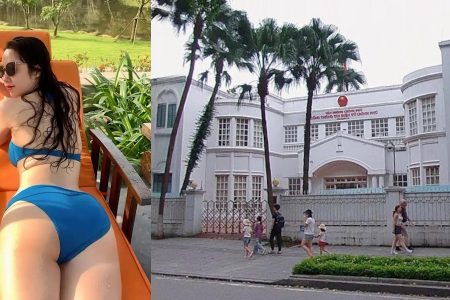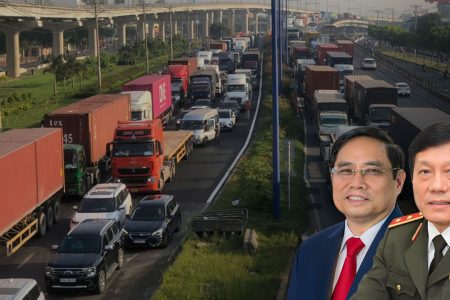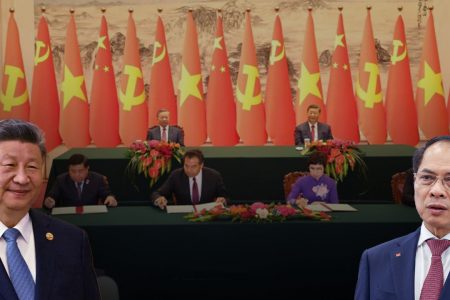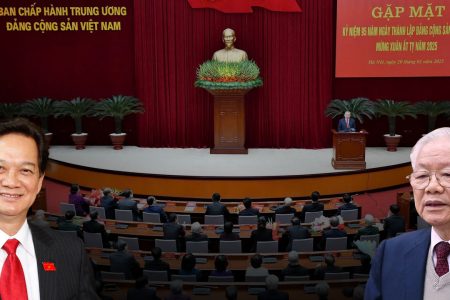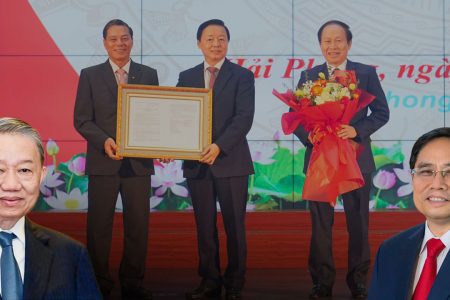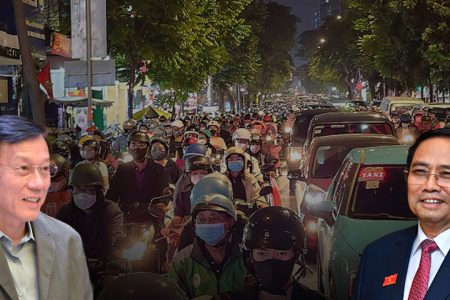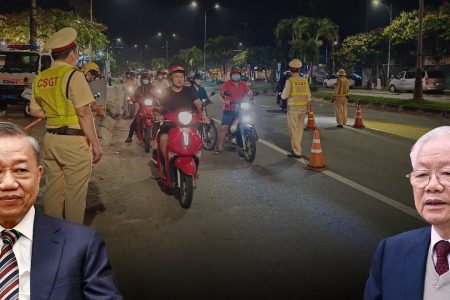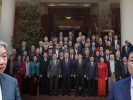
On February 17, 1979, China launched a massive attack on the entire northern border of Vietnam. The fierce border war between the two “communist” countries persisted until 1989 in some locations. However, so far, “the third Indochina war,” as some historians call it, is still almost completely absent from Vietnamese history textbooks.
What is the current state of teaching about the Vietnam-China border war? What are the reasons why the Vietnam-China war was almost excluded from history? RFI synthesizes some information on this topic, especially through the article “Why Won’t Vietnam Teach the History of the Sino-Vietnamese War?” by Travis Vincent (on The Diplomat, February 9, 2022).
1/ What is the current teaching of the history of the Vietnam-China border war in Vietnamese schools?
More than 40 years have passed since the 1979 war but teaching about the conflict is still largely absent from schools and universities. History textbook grade 12 in Vietnam, 2001 edition, narrates the Vietnam-China border war in 1979 with only 24 lines at the end of the book. The 2018 edition on the subject even shrinks the content down to just 11 lines.
This deliberate oblivion contrasts strangely with the detailed history of war against the Northern dynasties taught in Vietnamese schools. From 6th grade to 7th grade, Vietnamese students have been learning about a thousand years of Northern domination, wars of liberation, and resistance since the victory of Bach Dang in 938 against the Southern Qin Dynasty. Wars are studied more deeply from grade 10. The silence before the war that claimed the lives of tens of thousands of people, civilians, and Vietnamese soldiers, along with Chinese soldiers, raises many question marks.
Author of the article “Why Won’t Vietnam Teach the History of the Sino-Vietnamese War?”, social activist Travis Vincent gathered many witnesses on this issue. Nguyen Ngoc Tram, a history teacher at a private high school in Hanoi, said the war was put at the end of the school year program, so no one noticed it. The Vietnam-China border war is also not the content of the exam, so students are not motivated. According to teacher Nguyen Ngoc Tram, many of her friends – who did not major in history – were unaware of this war.
Dang Ngoc Oanh, a student at National Economics University, said that the reason for knowing about this war is because of his father, a veteran. She was shocked to learn there was such a fight. Pham Kim Ngoc, a 3rd-year international relations student in Ho Chi Minh City, reported that the teacher mentioned the war in a short lecture, but there were no textbooks on the topic. For the students, “such an event is still considered sensitive” while China is seen as a leading country in the program.
So far, the calls of experts on reforming history textbooks, to give more information about the Vietnam-China war in 1979, but the government has remained silent, although the government has allowed for more open information and discussion of the war in state media.
2/ What are the reasons why the Vietnam-China war was almost excluded from history?
China was the main force supporting the Democratic Republic of Vietnam regime in the wars against France, and later the US, and the US-backed Republic of Vietnam regime, but the relationship between the two countries declined rapidly since the 1970s. Beijing established diplomatic relations with the US, while Vietnam remained attached to the Soviet bloc. After Vietnam overthrew the genocidal Khmer Rouge regime which was backed by China, Beijing waged a war of border invasion in 1979, which China called to teach Vietnam’s “little tycoon” a lesson. In the 1980 Constitution, the communist regime of Vietnam called China the “aggressive Chinese hegemon” and “the most direct and dangerous enemy“.
From 1980 to 1987, Hanoi made many official and secret moves to resume normalization talks with Beijing but failed. In March 1988, China forcibly occupied many areas of the Truong Sa (Spratlys) controlled by Vietnam, with the Gac Ma (South Johnson-Reed) incident that killed 64 Vietnamese soldiers. However, it was also in December 1988 that the National Assembly of Vietnam abandoned the expression China is “the most direct and dangerous enemy” from the Constitution, to pave the way for the normalization of relations.
In the context of the collapse of the Soviet bloc, the isolation of Vietnam, and the international isolation of Beijing after the 1989 Tiananmen massacre, the two Communist parties held a secret meeting in 1990 in Chengdu, China. As a result, the Vietnamese government chose not to officially commemorate the Vietnam-China war in 1979. Relations were normalized in 1991. In 1999, Hanoi and Beijing established a “strategic partnership and comprehensive strategic cooperation.”
The agreement between the leadership of the two Communist parties that played a major role in the 1979 war and the long period of border warfare in the 1980s were forgotten, in society at large, and left out of the textbooks in particular. In addition to textbooks, in many museums, the 1979 Chinese invasion war has been avoided. Many traces related to the Chinese invasion were erased, buried in oblivion.
3/ In recent years there seem to have been some important changes? What are the main drivers of change?
The year 2016 is considered a remarkable turning point in the government’s attitude towards this historic event. In February 2016, President Truong Tan Sang was the first Vietnamese leader to pay a visit to commemorate soldiers who died in the war against Chinese aggression, in Cao Bang. Since then, on the occasion of the February 17 anniversary, information about the Vietnam – China war in 1979 has been mentioned more in the state media, although the articles are still censored.
Earlier this year, Prime Minister Pham Minh Chinh visited the Monument to Martyrs Against China in 1979 in Quang Ninh province. The search for the remains of fallen soldiers in Vi Xuyen (Ha Giang), where the war raged from 1984 to 1989, has been supported by the government.
On the government side, the author of the review on The Diplomat noted, Hanoi has made a significant change, in the context of China becoming more and more assertive in the South China Sea (Vietnam calls it the East Sea). In 2014, tensions between the two countries escalated to a climax with China placing an oil rig inside Vietnam’s exclusive economic zone. Many anti-China protests broke out across the country. Memories of the war revived in the public. Many people have become more interested in the recent past armed conflicts with their northern neighbors. Some people held protests, petitioned, and asked the State to officially commemorate the martyrs and victims of the border war against China’s aggression.
Playing a leading role in reopening discussions about the Vietnam-China border war are Vietnam veterans who participated in the conflict, along with their relatives. Especially the soldiers who fought in Vi Xuyen (Ha Giang). General Le Van Cuong, former director of the Strategic Research Institute of the Ministry of Public Security of Vietnam, admitted that “it can be extended to 2014 ie 35 years when we don’t celebrate rallies, seminars, or media talks. about this war.” (Dan Viet, February 17, 2022)
In general, however, the annual celebrations of the Vietnam-China war are judged to be on a much smaller scale than the victories against France and the United States. In many publications of newspapers or books, many people still avoid mentioning the word China. The book “Border Keepers,” one of the rare books on the northern border war published in 1979, also avoids mentioning the word China. The history teacher at a high school in Hanoi, Nguyen Ngoc Tram, still has to be very careful when including content related to the war in her lectures, fearing that parents will “complain about the content of the lesson different from textbooks.”
4/ What are the obstacles that make textbooks still barely talk about the Vietnam-China border war?
Travis Vincent’s article on The Diplomat quoted Mr. Duong Danh Dy, former consul general of Vietnam in Guangzhou, China, answering the BBC in 2018, saying that it is currently difficult to say who “directed” silent atmosphere about the Vietnam – China border war.
According to Professor Vu Tuong, Faculty of Political Science at the University of Oregon (USA), so far, the Sino-Vietnamese war has still divided Hanoi’s leadership. Professor Vu Tuong mentioned two factions, taking opposing positions on this topic: one side blamed Le Duan, the late powerful leader of the Communist Party of Vietnam (1907 – 1986), for his anti-Chinese stance. The other side thinks that the party has made a mistake when it believes too much in China. One of the questions that many Vietnamese leaders may be afraid to face is “Can Vietnam avoid the 1979 war with China?” The assumption shared by many observers is that Beijing “will not dare to wage a large-scale war against Vietnam if Vietnam and the US soon normalize relations” after 1975.
Responding to author Travis Vincent via email, Professor Vu Tuong commented: “Allowing any discussion about the war risks deepening that rift, exposing the mistakes of the leadership.” Professor Vu Tuong emphasized that: “teaching children about this war can create public pressure to force the party away from China, and closer to the US. This is what the party does not want.”
Responding to RFI in Vietnamese, writer Pham Viet Dao, the author of many studies on the Vietnam-China border war (including the editorial series Vi Xuyen: Vietnam-China affairs) commented: The current Vietnamese leadership there may be many “entanglements” with China so it is not possible to introduce changes in the textbook problem, despite the demands in society about this in the futures. Recent years have been very clear. Heavy financial dependence from China can be a major cause. But the ordinary people could not have proof of the story that took place on a superpower.
Thoibao.de (Translated)
Millions of THANKS!
Millions of people have watched our news and programs. More and more people choose to support us. Because there is an urgent need for an independent, critical voice in the media for Vietnam.
Your support will help everyone to have free access to thoibao.de. Because we consider the press not only a communication product but also a beneficial activity for the community.
There have been tens of millions of people every month who do not have to pay any money to read news on thoibao.de, but as you know, we have to invest a lot in order to have quality journalism. That’s why we need your support.
You can send your support as follow
1/ Via Paypal, Visa, Mastercard, America Experess, Sepa Lastschrift:
2/ Via bank transfer:
Account name: Thoibao.de
IBAN: DE36 1005 0000 0190 636319
SWIFT: BELADEBE
Address: Berliner Sparkasse, Ostseestr. 109, 10409 Berlin, Germany
When sponsoring or transferring money, please write the words: Support thoibao.de
Thank you very much
Le Trung Khoa – editor-in-chief
Email: info@thoibao.de
Viber/WhatsApp/Telegram/Signal: +49 170 2363084





